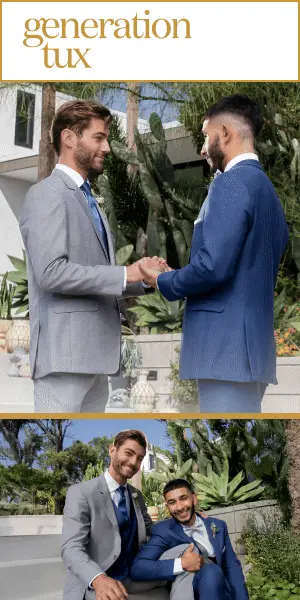This week, an Associated Press article (below) quoting me has been released on and in a multitude of news sites and newspapers. The writer, Leanne Italie, was interviewing gays and lesbians who’d taken their partners’ last names. She wanted to know why, how it happened and how it felt. It was an interesting question to be asked, and I was more than happy to speak about it.
Changing my name from Kirsten Marguerite Ott to Kirsten Ott Palladino in the court system in Georgia was far easier than I thought it would be. It didn’t happen overnight though. After Maria and I had our wedding in 2009 (we’ve been together since early 2004), I wanted to make it as official as I could in Georgia, where our marriage isn’t legally recognized, by sealing our family unit and becoming one in name. Following the advice of many of my dear lesbian friends who’ve gone before me in this journey, I went to the courthouse and filled out paperwork for a legal name change. In the box where I was supposed to say why I wanted to change my name, I was completely honest (and hoping that I wouldn’t be stuck with a narrow-minded hick of a judge who had a problem with gay weddings) and wrote that I’d recently married my partner and now we wanted to have the same last name. After I gave my form to a nice clerk, I was given a court date five weeks from then, and told to go to the local newspaper of record’s office and place a name-change ad to run for four consecutive weeks. After that highly personal ad ran in the public newspaper for a month (something straight married people do not have to be subjected to), the paper sent me a receipt stating that the ad had indeed run. I had to take this to the courthouse on my court date.
When that day came, Maria accompanied me to the courtroom. I was excited and nervous at the same time. I was about to become a Palladino! But what if this judge took one look at me and decided to take my very small but important right away, when I barely have any to stand on as it is, when it comes to my marriage with Maria? I was petrified. My name was called, and I had to go before the judge. He was a mere two feet away from my face as he hummed along to a strange tune while he read through my statement. He asked me a few questions, but it had nothing to do with my stated reasons. I was in a fog until I saw him scrawl his name across the form. He said yes! I wanted to hug him. To him, he was just doing his job. To me, he was saying I believe in you and your love.
Because Georgia doesn’t currently have any form of same-sex marriage recognition as a state, all we have is the ability to change our last names to express our unions to the public, our social and work circles. And especially because Maria and I want to have children someday, we felt it was vital to share the same last name.
However, I did have major identity issues after I changed my name. Being a journalist for 10 years and building up the recognition of the byline Kirsten Ott was hard to let go of. For awhile, I played with Kirsten Ott Palladino as my byline, but it seemed so complicated and I got irritated when someone would write Mrs. Ott-Palladino. Another tough part for me was that it was my outward connection to my dear, wonderful father, who passed away just eight months before our wedding. These challenges have been small compared to the completeness that Maria and I feel as a family unit sharing the same last name. I love being her wife and having her last name.
What about you? Will you take—or have you already taken—your partner’s last name or vice versa?
Name changing for gay couples not a straight line
Same-sex couples are changing their last name as a way to express their union
By Leanne Italie
In October 2008, racing against California’s gay marriage ban, Chloe and Frankie Frankeny wed legally in San Francisco with one chore already done: Chloe had taken her wife’s name two years before.
“It was the only way we had to fit into a mainstream role that was understandable to anybody,” said Chloe, managing editor of a fashion website. “When I told my father I was taking Frankie’s name he was sort of blown away because I definitely consider myself a feminist.”
With a battle over the state’s ban on gay marriage possibly headed to the U.S. Supreme Court, it’s likely more same-sex couples will do the same. For the Frankenys, the name switch couldn’t magically grant all the marriage benefits denied same-sex couples when compared to one man, one wife, but it was one more way to express their union. It’s a symbol rendered even stronger now that legal gay marriages are on hold in California, and for partners who’ve never had the option.
Logistically, a name-change for gay couples isn’t always as simple as trotting out a marriage certificate, the proof most required in heterosexual marriage. Emotionally, the journey is about love, commitment — and a way to ease anxiety over being misunderstood as non-relatives in emergencies or considered less-than as parents.
Kirsten Palladino, who runs the online gay wedding magazine Equally Wed, shed Ott for the surname of her partner, Maria, last year without benefit of a state-sanctioned union in Georgia. She’s seeing more couples go to court for name changes, settling on hyphenation or one partner’s surname over the other.
“We have grown stronger and are speaking out for ourselves in this way,” said Palladino, 32. “There’s nothing stopping us from taking each other’s names, even if we can’t get a marriage certificate.”
After a five-year courtship, the Palladinos had a wedding at an antebellum mansion in Decatur, Ga. Kirsten became a Palladino after running a newspaper announcement of her intentions once a week for four weeks and appearing before a judge, just as people going through a formal name change for reasons other than marriage must do.
“I was nervous. I didn’t know how the judge would feel, but he was great. Personally, I had to deal with some identity issues after, but becoming a family unit with my wife trumped anything else for me,” she said.
College sweethearts Kathryn and Heather Kraft of Newton, Mass., just celebrated 12 years together and have a new baby. They had a church wedding five years ago in white gowns with 10 bridesmaids after obtaining a marriage license under their state’s gay marriage law.
Whose name did they choose? Kathryn said her Kraft over Heather’s Cole “because we’re very close to my family and wanted to add to that family in a noticeable way.” They had considered combining names into a new one that “represented both of our ancestry, but in the end we’re very traditional people.” Cole is now a middle name for the entire family, including baby Esther.
Making the switch with a legal marriage certificate was no trouble for Heather, until she tried to get a U.S. passport ahead of a trip to Europe. “We were shocked when Heather’s application was denied,” said her 32-year-old partner, a family therapist. “The passport office would not recognize our marriage certificate as proof and insisted that she had to go in front of a judge to have a court-ordered name change.”
After six months, she was issued a “known as” passport identifying her by both names. “It’s a small thing that isn’t noticeable when you look at her passport, but the process was long and an unnecessary reminder that things aren’t exactly equal,” Kathryn said.
Jason and Anthony Cline committed to each other in 2001 during a hotel ceremony in their native Indiana, where gay marriage is outlawed. They thought about heading to a state where their union would be legal but decided not to bother knowing they’d return home to suburban Indianapolis without that recognition.
Jason, 33, legally changed his name, going through a newspaper notification process and enduring questions from a judge as Palladino did.
“The process seemed cold but it helped prove our relationship to our friends and family that maybe weren’t as advanced in their thinking on the topic. It helped solidify our relationship to the people that we knew and to the world,” he said. “It starts a conversation. It tells a story.”
Chloe Frankeny sees other practical outcomes to changing her name, including proof of family status in case of a medical crisis.
“With the same last name we could say we were sisters,” she said. “We’ve all heard stories of partners kept apart in emergency rooms. That was a precaution we wanted to take.”
From nearly 80 percent to 95 percent of heterosexual couples marrying for the first time legally adjust their names as the age of the average bride has risen to about 27 over the last 20 years, according to research. Professional identity before marriage motivates others — in same-sex and hetero couples alike — to keep their original names informally or incorporate them as middle names.
Elisa Hebert, 32, wasn’t attached to her surname before she traveled with partner Megan from their home outside Denver, Colo., to Rehoboth, Mass., a plus since most of their friends and family are from New England. Back home, Elisa appeared in court to complete her legal name change before a judge managing a roomful of ticked-off parents and their kids hauled in for truancy. “I felt like a 12-year-old who was in trouble,” she said.
Marni Kahn, a doctoral candidate in sociology in Atlanta, took partner Casey Brown’s last name after a marriage ceremony that blended their Jewish and Southern Baptist roots. “It really did tie things up nicely,” said Casey, a marketing analyst.
Actor and writer Marcos Mateo Ochoa, 29, of Los Angeles chose to hyphenate instead. He goes by Cermak-Ochoa after marrying partner Frank Cermak on Oct. 4, 2008, a union legally recognized in California with 18,000 other same-sex marriages there before voters approved Proposition 8 and ended the practice. He plans to make the name switch legal once the court case is resolved.
“We want to identify ourselves as being united, but with California being so flip-floppy on this, it’s just a matter of when we go about the process,” Ochoa said. “Is this going to be another obstacle, another hurdle for us to go through?”
MOST VIEWED STORIES
- The Rise of Weddings With Long-Lasting Investments: Benefits Beyond The Big Day
- How to have a green wedding that Mother Earth would attend
- Simplify wedding communication with digital engagement announcements and thank you cards
- A Spiritual and Earthy Elopement at Lassen Volcanic National Park
- Food Trucks, Craft Booze and Cultural Fusions: How New England Weddings Are Changing the Game


























